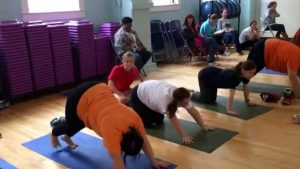Improve Functional Fitness in Adults with Intellectual and Developmental Disabilities with Yoga
By John M. de Castro, Ph.D.
“yoga intervention may have the potential to enhance functional fitness in people with Intellectual and developmental disabilities.” – Kaitlin Mueller
Intellectual and developmental disabilities involve below average intelligence and relatively slow learning. They are quite common, affecting an estimated 10% of individuals worldwide. These disabilities present problems for the individual in learning mathematics, reading and writing. These difficulties, in turn, affect performance in other academic disciplines. The presence of intellectual disabilities can have serious consequences for the psychological well-being of the individual, including their self-esteem and social skills. In addition, anxiety, depression, and conduct disorders often accompany learning disabilities.
Adults with intellectual and developmental disabilities often show “physical decline in sensorimotor skills, coordination, muscular strength, flexibility, and balance in part due to physical inactivity.” So, it is important to increase physical activity in these adults. Yoga is a mindfulness practice and exercise that has been shown to be a safe and effective practice. So, yoga practice may be helpful for reducing the physical decline in adults with intellectual and developmental disabilities.
In today’s Research News article “Yoga for Functional Fitness in Adults with Intellectual and Developmental Disabilities.” (See summary below or view the full text of the study at: https://www.ncbi.nlm.nih.gov/pmc/articles/PMC7336942/ ) Reina and colleagues recruited adults diagnosed with intellectual and developmental disabilities. They were provided a 7 week, twice a week for 1 hour, group yoga practice. They were measured before and after the program for functional fitness.
They found that after the program the participants had significant improvements in both lower and upper body strength, agility and balance. Non-significant improvements were also detected in lower-body flexibility, upper-body flexibility, and endurance. It should be kept in mind that this was a pilot study that did not include a control condition. So, there are a number of potential alternative explanations for the results. But previous controlled studies have demonstrated that yoga practice improves physical performance. So, it is likely that the present improvements were due to the yoga practice.
Hence, yoga practice appears to improve the functional fitness of adults with intellectual and developmental disabilities. This suggests that yoga is safe and effective practice for reducing the decline in physical ability that is common in adults with intellectual and developmental disabilities. It remains for future research to determine if these improvements spill over to improvements in other functional realms.
So, improve functional fitness in adults with intellectual and developmental disabilities with yoga.
“Yoga is an effective intervention to improve functional fitness in adults with and without disabilities,” – Clair Allison
CMCS – Center for Mindfulness and Contemplative Studies
This and other Contemplative Studies posts are also available on Google+ https://plus.google.com/106784388191201299496/posts and on Twitter @MindfulResearch
Study Summary
Reina, A. M., Adams, E. V., Allison, C. K., Mueller, K. E., Crowe, B. M., van Puymbroeck, M., & Schmid, A. A. (2020). Yoga for Functional Fitness in Adults with Intellectual and Developmental Disabilities. International journal of yoga, 13(2), 156–159. https://doi.org/10.4103/ijoy.IJOY_57_19
Abstract
Background:
Yoga is an effective intervention to improve functional fitness in adults with and without disabilities, but little research exists regarding yoga’s impact on functional fitness for individuals with intellectual and developmental disabilities (IDDs).
Aims:
The purpose of this study was to examine the benefits of a group yoga intervention on the functional fitness of adults with IDDs.
Methods and Materials:
This yoga intervention included 12 sessions of yoga over 7 weeks (60-min sessions twice a week) at a special population recreation and leisure program. The functional fitness test was used to examine physical functioning before and after the yoga intervention.
Results and Conclusions:
Eight adults completed the baseline and posttest measures (age mean = 31; standard deviation = 6.55; 50% male). There were significant improvements in lower-body strength (9.00 ± 4.63 vs. 11.50 ± 3.16, P = 0.04, 28% improvement), upper-body strength (11.25 ± 3.54 vs. 14.25 ± 3.37, P = 0.018, 27% improvement), and agility and balance (9.29 ± 4.1 vs. 6.60 ± 1.54, P = 0.036, 29% improvement). Functional fitness often declines for people with IDD at a faster rate than the general population; thus, these significant changes indicate that a yoga intervention may enhance functional fitness for people with IDD. Clinicians or other healthcare providers might consider yoga as a means to improve functional fitness in adults with IDDs.
